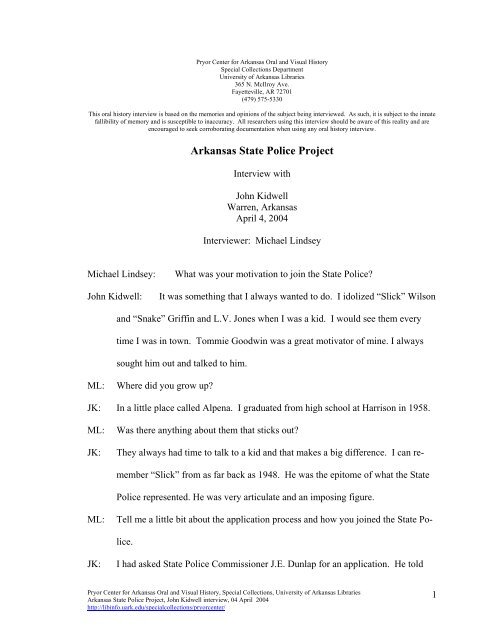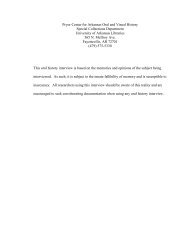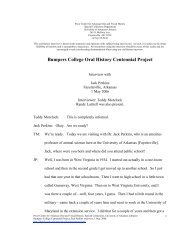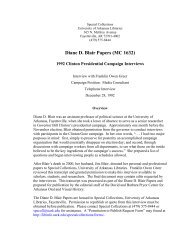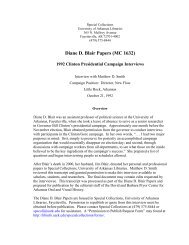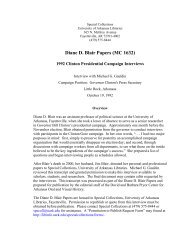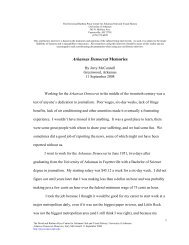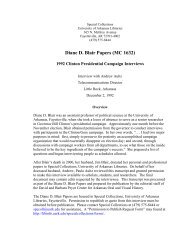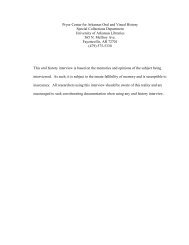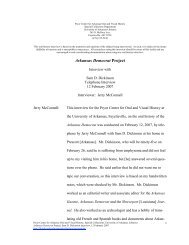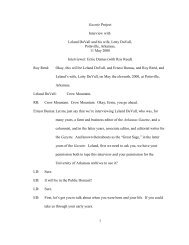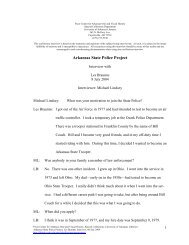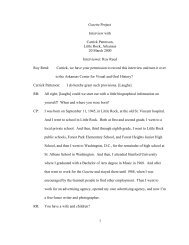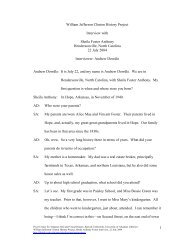Kidwell, John - Pryor Center home page - University of Arkansas
Kidwell, John - Pryor Center home page - University of Arkansas
Kidwell, John - Pryor Center home page - University of Arkansas
You also want an ePaper? Increase the reach of your titles
YUMPU automatically turns print PDFs into web optimized ePapers that Google loves.
<strong>Pryor</strong> <strong>Center</strong> for <strong>Arkansas</strong> Oral and Visual History<br />
Special Collections Department<br />
<strong>University</strong> <strong>of</strong> <strong>Arkansas</strong> Libraries<br />
365 N. McIlroy Ave.<br />
Fayetteville, AR 72701<br />
(479) 575-5330<br />
This oral history interview is based on the memories and opinions <strong>of</strong> the subject being interviewed. As such, it is subject to the innate<br />
fallibility <strong>of</strong> memory and is susceptible to inaccuracy. All researchers using this interview should be aware <strong>of</strong> this reality and are<br />
encouraged to seek corroborating documentation when using any oral history interview.<br />
<strong>Arkansas</strong> State Police Project<br />
Interview with<br />
<strong>John</strong> <strong>Kidwell</strong><br />
Warren, <strong>Arkansas</strong><br />
April 4, 2004<br />
Interviewer: Michael Lindsey<br />
Michael Lindsey: What was your motivation to join the State Police?<br />
<strong>John</strong> <strong>Kidwell</strong>: It was something that I always wanted to do. I idolized “Slick” Wilson<br />
and “Snake” Griffin and L.V. Jones when I was a kid. I would see them every<br />
time I was in town. Tommie Goodwin was a great motivator <strong>of</strong> mine. I always<br />
sought him out and talked to him.<br />
ML: Where did you grow up?<br />
JK: In a little place called Alpena. I graduated from high school at Harrison in 1958.<br />
ML: Was there anything about them that sticks out?<br />
JK: They always had time to talk to a kid and that makes a big difference. I can re-<br />
member “Slick” from as far back as 1948. He was the epitome <strong>of</strong> what the State<br />
Police represented. He was very articulate and an imposing figure.<br />
ML: Tell me a little bit about the application process and how you joined the State Po-<br />
lice.<br />
JK: I had asked State Police Commissioner J.E. Dunlap for an application. He told<br />
<strong>Pryor</strong> <strong>Center</strong> for <strong>Arkansas</strong> Oral and Visual History, Special Collections, <strong>University</strong> <strong>of</strong> <strong>Arkansas</strong> Libraries<br />
<strong>Arkansas</strong> State Police Project, <strong>John</strong> <strong>Kidwell</strong> interview, 04 April 2004<br />
http://libinfo.uark.edu/specialcollections/pryorcenter/<br />
1
me I was too young to become a Trooper, so I applied to be a radio operator. In<br />
1962 I started as a radio operator at the station just outside <strong>of</strong> Bellefonte. I<br />
worked there until the spring <strong>of</strong> 1964 when I went to work as a Trooper. The ap-<br />
plication process was the same as it is today except we didn’t have to compete<br />
with minorities because they weren’t hiring minorities back then. I went to work<br />
and was sent to Texarkana.<br />
ML: That is at the opposite end <strong>of</strong> the state. How did you feel about getting sent down<br />
to Texarkana?<br />
JK: It didn’t bother me. I wanted to be a State Policeman and it didn’t matter where<br />
they sent me. I enjoyed my career and each place I went.<br />
ML: You have been almost everywhere in the state.<br />
JK: I have been assigned to each corner.<br />
ML: I haven’t lived in the other parts <strong>of</strong> the state, but it seems like the other parts <strong>of</strong><br />
the state are different, whether it is the climate, the people, or the land. What is<br />
your perspective on that?<br />
JK: There is a big difference in the people. You can start at the Mississippi state line<br />
and to west and see the changes. There is a difference between people in Lake<br />
Village and Monticello and there is another difference between the people in<br />
Monticello and Camden. I have found out one thing about people and that is if<br />
you shoot straight with everyone, no matter where you were, you won’t have to<br />
worry about it.<br />
ML: Was the activity different in the different areas?<br />
JK: Not really. The cultures are different, though.<br />
<strong>Pryor</strong> <strong>Center</strong> for <strong>Arkansas</strong> Oral and Visual History, Special Collections, <strong>University</strong> <strong>of</strong> <strong>Arkansas</strong> Libraries<br />
<strong>Arkansas</strong> State Police Project, <strong>John</strong> <strong>Kidwell</strong> interview, 04 April 2004<br />
http://libinfo.uark.edu/specialcollections/pryorcenter/<br />
2
ML: How long were you stationed in Texarkana?<br />
JK: I went there in April 1964 and I went to troop school in August. From there I had<br />
the opportunity to transfer to Yellville, so I came back to north <strong>Arkansas</strong>.<br />
ML: While you were a radio operator in Bellefonte, what Troop was that a part <strong>of</strong>?<br />
JK: There were four Districts or Troops at that time. That was District Three. Its<br />
headquarters was in Fort Smith. The other headquarters were in Hope, Newport,<br />
and Little Rock.<br />
ML: What sort <strong>of</strong> radio contact did you have with the Troopers?<br />
JK: Very limited. The entire system was antiquated.<br />
ML: Do you remember any instances that it posed a particular problem?<br />
JK: I don’t recall a specific instance. Each Trooper in an outlying county had a coun-<br />
ty radio too. They could communicate with the sheriff’s <strong>of</strong>fice if they couldn’t<br />
communicate with me. It is still a very scary thing to know that people were out<br />
there and didn’t have good communications.<br />
ML: How long was your troop school?<br />
JK: One month. But when we went, we stayed seven days a week, twenty-four hours<br />
a day. It was at Camp Robinson. We had the largest troop school in the history<br />
<strong>of</strong> the State Police with seventy.<br />
ML: Did they divide you up into separate classes?<br />
JK: We had different squads, but we were all in class together, in firearms training<br />
together, we ate together. There was a lot <strong>of</strong> togetherness.<br />
ML: Why were there so many troopers in this school?<br />
JK: It had been a long time since they had a school. We had several new people and<br />
<strong>Pryor</strong> <strong>Center</strong> for <strong>Arkansas</strong> Oral and Visual History, Special Collections, <strong>University</strong> <strong>of</strong> <strong>Arkansas</strong> Libraries<br />
<strong>Arkansas</strong> State Police Project, <strong>John</strong> <strong>Kidwell</strong> interview, 04 April 2004<br />
http://libinfo.uark.edu/specialcollections/pryorcenter/<br />
3
some that had been there a while.<br />
ML: Moving back to Northwest <strong>Arkansas</strong> must have been a little more comfortable for<br />
you.<br />
JK: I was never uncomfortable in Texarkana. I have always been able to adapt. I<br />
spent four years in the Navy after high school. I was a radioman on a destroyer<br />
tender.<br />
ML: How long were you in Yellville?<br />
JK: I was there for five years.<br />
ML: In 1968, Martin Luther King was killed and there was a lot <strong>of</strong> racial unrest in<br />
Memphis and east <strong>Arkansas</strong>. Did you get sent to any <strong>of</strong> those disturbances?<br />
JK: Yes. It was a very traumatic time for all races. It was a very painful time in our<br />
history. I went over to Memphis when Martin Luther King was killed. It was an<br />
eye opener at the very least. Emotions were running extremely high and it wasn’t<br />
a pleasant time.<br />
ML: Were you one <strong>of</strong> the Troopers who were deputized by the Shelby County Sheriff<br />
and sent into Memphis? Did they give you any preparation about what you would<br />
see or experience?<br />
JK: Yes I was deputized. I knew what I was going to be getting into because I saw it<br />
heading over to Memphis. It was chaos. It was a very unpleasant situation for<br />
everyone involved. The sheriff was named Morris and Henry Logue was the<br />
Mayor and he talked to us also. We partnered up with <strong>of</strong>ficers on the Tennessee<br />
side. We patrolled inside Memphis and went to all <strong>of</strong> the hot spots. It is some-<br />
thing I don’t even like to talk about.<br />
<strong>Pryor</strong> <strong>Center</strong> for <strong>Arkansas</strong> Oral and Visual History, Special Collections, <strong>University</strong> <strong>of</strong> <strong>Arkansas</strong> Libraries<br />
<strong>Arkansas</strong> State Police Project, <strong>John</strong> <strong>Kidwell</strong> interview, 04 April 2004<br />
http://libinfo.uark.edu/specialcollections/pryorcenter/<br />
4
ML: Shortly thereafter many <strong>of</strong> the Troopers were sent to Pine Bluff.<br />
JK: I stayed in Forrest City and when we got cut loose there after a few days some<br />
went to Pine Bluff and some went to Hot Springs, but I went back to Yellville. I<br />
made all <strong>of</strong> the civil unrests: Marianna, Forrest City, Wynne, and Earle. It was up<br />
and down Interstate 55. It was not one <strong>of</strong> the bright spots in my life.<br />
ML: Did you get a feel for why this particular time was so explosive?<br />
JK: People wanted their rights. They were tired <strong>of</strong> being treated like a second-class<br />
citizen. I know I would have been tired <strong>of</strong> it. It was overdue that they got their<br />
equal rights.<br />
ML: Do you think these situations placed stresses on the State Police to be put in the<br />
middle <strong>of</strong> those situations?<br />
JK: Absolutely. It is stress on the Department, the <strong>of</strong>ficers, and their families. You<br />
are gone from <strong>home</strong> for two and three weeks at a time on special assignment. We<br />
went to Marianna and we were over there for quite a while and it was pretty<br />
rough. The same with Forrest City. When you are lined up and you have a group<br />
<strong>of</strong> black people on one side and a group <strong>of</strong> white people on the other and they are<br />
both very hostile it is stressful. The National Guardsmen assigned to us weren’t<br />
much good because they were <strong>home</strong> folks. We didn’t have that many people and<br />
it was very hairy.<br />
ML: Did they give you any sort <strong>of</strong> special training to deal with riots?<br />
JK: From the time I went to work until just a few years ago we had special riot train-<br />
ing. It is very much based on military techniques. We aren’t dealing with the<br />
same types <strong>of</strong> situations anymore. Now it is terrorist attacks that are the concern.<br />
<strong>Pryor</strong> <strong>Center</strong> for <strong>Arkansas</strong> Oral and Visual History, Special Collections, <strong>University</strong> <strong>of</strong> <strong>Arkansas</strong> Libraries<br />
<strong>Arkansas</strong> State Police Project, <strong>John</strong> <strong>Kidwell</strong> interview, 04 April 2004<br />
http://libinfo.uark.edu/specialcollections/pryorcenter/<br />
5
When I went to work people would get in fistfights, but now they are liable to<br />
step out with a machine gun.<br />
ML: After Yellville, you moved to Batesville?<br />
JK: I took Alan Bufford’s place. He had been shot and killed. I was there for six or<br />
seven months when I was promoted and moved to DeQueen in south <strong>Arkansas</strong>.<br />
ML: What were the duties <strong>of</strong> the Post Sergeant?<br />
JK: It is much like the military. You have a squad <strong>of</strong> people you are accountable for.<br />
You create the schedule for work, days <strong>of</strong>f, and vacations to make sure you have<br />
coverage in the five county area. Most <strong>of</strong> the people that we had were dedicated,<br />
hard working Troopers.<br />
ML: At the time you were working six days a week, ten hours a day.<br />
JK: I would have liked to have had just ten hours a day. [laughs] We were called out<br />
quite a bit.<br />
ML: That had to put a lot <strong>of</strong> stress on your family. How did you deal with that and at-<br />
tempt to alleviate the stress for your Troopers?<br />
JK: You try to give them time <strong>of</strong>f when they need it. You have to be very flexible. It<br />
isn’t exactly like the military because you had to be flexible. If something came<br />
up, like ball games or birthday parties, you did your best to get them <strong>of</strong>f and their<br />
shift covered. Even though we are semi-military we aren’t as inflexible.<br />
ML: Were you married at this time?<br />
JK: Yes, I was married before I went to work for the State Police.<br />
ML: How did the moves and working six days a week affect your family life?<br />
JK: It must have done something for us because we have six children. [laughs] We are<br />
<strong>Pryor</strong> <strong>Center</strong> for <strong>Arkansas</strong> Oral and Visual History, Special Collections, <strong>University</strong> <strong>of</strong> <strong>Arkansas</strong> Libraries<br />
<strong>Arkansas</strong> State Police Project, <strong>John</strong> <strong>Kidwell</strong> interview, 04 April 2004<br />
http://libinfo.uark.edu/specialcollections/pryorcenter/<br />
6
still married. I have known my wife for all <strong>of</strong> my life because she was raised in<br />
Alpena.<br />
ML: That is amazing and speaks well <strong>of</strong> you, your wife, and your kids, because I have<br />
heard that the hours and the stress really take a toll on the family life and divorce<br />
is really common.<br />
JK: Divorce is very common in law enforcement. My wife and I graduated from high<br />
school on a Friday and we got married on Saturday. I am very proud <strong>of</strong> wife.<br />
ML: How long were you at DeQueen?<br />
JK: About a year and then I went back up to Walnut Ridge. I stayed there until 1976<br />
and then moved to Springdale. I was promoted to Lieutenant. At that time<br />
Springdale was still part <strong>of</strong> Troop H in Fort Smith. I stayed there for a year and<br />
then transferred to Warren and worked under Jimmy Loman until he retired and I<br />
was promoted to Captain. I was Captain at Warren from 1983 to 1995, which is a<br />
long run.<br />
ML: One thing that actually happened before Martin Luther King was assassinated was<br />
the problem at the penitentiaries. Did you get sent down for that stuff?<br />
JK: I certainly did.<br />
ML: I actually knew that you were sent down there because I have people talk about<br />
how big you are and that anytime something like this happened they sent down<br />
the biggest guys they could find.<br />
JK: They really did. [laughs] We went down and took over Tucker Farm. They were<br />
running away from the penitentiary in droves. We stopped the runaways. Deloin<br />
Causey and I were roommates at Tucker Farm. The penitentiary is an all-together<br />
<strong>Pryor</strong> <strong>Center</strong> for <strong>Arkansas</strong> Oral and Visual History, Special Collections, <strong>University</strong> <strong>of</strong> <strong>Arkansas</strong> Libraries<br />
<strong>Arkansas</strong> State Police Project, <strong>John</strong> <strong>Kidwell</strong> interview, 04 April 2004<br />
http://libinfo.uark.edu/specialcollections/pryorcenter/<br />
7
different climate. They are called cons for a very good reason. It was a learning<br />
experience that everyone should have a taste <strong>of</strong>. Every youngster should have a<br />
tour <strong>of</strong> the penal system. That would scare someone straight. If it is run right it<br />
can be a very productive thing. If it is not it can be a training ground for crimi-<br />
nals. I was down there too long and was ready to come <strong>home</strong>. When I was down<br />
there I was in my twenties and I had a little redheaded wife at <strong>home</strong> with two kids<br />
and my oldest son on the way in 1969. I didn’t like to be away from <strong>home</strong>.<br />
ML: You said you helped stopped the runaways and breakouts. Can you talk a little bit<br />
about what you did to curb this?<br />
JK: We provided stronger supervision. We provided more patrol and we made them<br />
accountable for everything that was done. If they left with something in a “doby<br />
wagon” to deliver some materials then everything in that wagon had better be de-<br />
livered exactly where it was supposed to go. A “doby wagon” is just a horse<br />
drawn wagon that they used to gather eggs or vegetables. We were very strict on<br />
collecting and overseeing all <strong>of</strong> that.<br />
ML: Where were the State Police housed?<br />
JK: We were on “free row.” It was right across a big drainage ditch from the peniten-<br />
tiary. We had convicts that cooked for us and made up our beds. They were the<br />
trusties, but they were closely monitored. You could hear everything but meat<br />
frying and money rattling from those people. They will tell you anything that<br />
makes them look good. I have only talked to a very few that have ever admitted<br />
to being guilty. Just like most <strong>of</strong> the drunks I have picked up in my career have<br />
told me they hadn’t had over two beers. [laughs]<br />
<strong>Pryor</strong> <strong>Center</strong> for <strong>Arkansas</strong> Oral and Visual History, Special Collections, <strong>University</strong> <strong>of</strong> <strong>Arkansas</strong> Libraries<br />
<strong>Arkansas</strong> State Police Project, <strong>John</strong> <strong>Kidwell</strong> interview, 04 April 2004<br />
http://libinfo.uark.edu/specialcollections/pryorcenter/<br />
8
ML: I have heard that a lot <strong>of</strong> the people that were running away were trusty guards<br />
because they did not want to be put back in the general population.<br />
JK: When we first got there and went back in the back to put them up. I removed all<br />
sharp objects in my belt and took <strong>of</strong>f my tie. Guess who I saw issuing guns out <strong>of</strong><br />
the armory? A trustee that had been sent to the penitentiary for killing a sheriff’s<br />
deputy in Oakland. He killed Lester Elliott’s son who was a reserve deputy there.<br />
That was not a good feeling.<br />
ML: A lot <strong>of</strong> people I have talked to say that Captains in the State Police tend to be rel-<br />
atively independent and they run the troops the way they feel they should be run.<br />
Do you agree with that sentiment or do you think the State Police is more <strong>of</strong> a<br />
top-down organization?<br />
JK: Some people have to have more supervision than others. By the time you achieve<br />
the rank <strong>of</strong> Captain you should have the experience to know how the department<br />
wants something done. You have a policy book and we have a Major that you an-<br />
swer to. If something is not right then hew would certainly call it to our attention.<br />
I ran the troop exactly like Jimmy Loman ran the troop prior to me. He was very<br />
efficient and one <strong>of</strong> the best administrators I had ever known. He had been in the<br />
National Guard for thirty-eight years and served in World War II. He was a stick-<br />
ler for having things right, which is the only way to go. When we got a new<br />
Trooper in we had rules that we talked to them about. First and foremost was to<br />
always tell us the truth. Don’t lie to us. If I ask them if they hit a man, then they<br />
don’t need to tell me they used appropriate force. I have to know if they hit them<br />
ten times in the head with a “slapper” so we don’t get surprised. Rules aren’t<br />
<strong>Pryor</strong> <strong>Center</strong> for <strong>Arkansas</strong> Oral and Visual History, Special Collections, <strong>University</strong> <strong>of</strong> <strong>Arkansas</strong> Libraries<br />
<strong>Arkansas</strong> State Police Project, <strong>John</strong> <strong>Kidwell</strong> interview, 04 April 2004<br />
http://libinfo.uark.edu/specialcollections/pryorcenter/<br />
9
flexible, but policies are.<br />
ML: How would you gauge the activity <strong>of</strong> the Troopers?<br />
JK: I monitored their weekly activity. Every county is not the same. Some are small<br />
and have small thoroughfares in them. The level <strong>of</strong> activity depends on the type<br />
<strong>of</strong> highways in their county. You have to take this in consideration when you<br />
look at activity. Accident experience is another good indicator. If accidents are<br />
high then someone isn’t working. If a Trooper is out there working then he will<br />
run into stolen cars or run into thieves. Most <strong>of</strong> our Troopers were very good and<br />
we had very few duds.<br />
ML: If a Trooper wasn’t performing up to certain standards, how would you try and<br />
correct that?<br />
JK: Number one, the Sergeant would counsel him. If that didn’t work he would be<br />
brought in to the Captain or Lieutenant. There are any numbers <strong>of</strong> factors that can<br />
come into play in situations like this. They could be having family problems or<br />
monetary problems. They might be sick, mentally or physically. You have to<br />
take each one on a case by case basis.<br />
ML: What was your relationship with the sheriffs?<br />
JK: I had very good working relationships with most sheriffs. Once in a while you<br />
would have difficulties.<br />
ML: Did you find that sheriffs in different parts <strong>of</strong> the state were different or viewed<br />
the State Police in a different light?<br />
JK: Absolutely. One or two <strong>of</strong> the worst problems I have had with sheriffs were from<br />
former State Police <strong>of</strong>ficers. A lot <strong>of</strong> them had never had a position <strong>of</strong> authority<br />
<strong>Pryor</strong> <strong>Center</strong> for <strong>Arkansas</strong> Oral and Visual History, Special Collections, <strong>University</strong> <strong>of</strong> <strong>Arkansas</strong> Libraries<br />
<strong>Arkansas</strong> State Police Project, <strong>John</strong> <strong>Kidwell</strong> interview, 04 April 2004<br />
http://libinfo.uark.edu/specialcollections/pryorcenter/<br />
10
like that. Also, I never wanted anyone fooling with our tickets. When I was she-<br />
riff here I didn’t fool with tickets. If someone is pulling tickets it can kill morale.<br />
But overall I have found that law enforcement agencies work very closely togeth-<br />
er. When I was at Yellville one <strong>of</strong> the sheriff’s deputies rode with me nearly<br />
every day. That doesn’t happen as much anymore because they have more people<br />
and communications are better. They don’t interact like they used to.<br />
ML: Since you served in the more rural areas <strong>of</strong> the state, I have heard that in these lo-<br />
cations the State Police takes on a different role within the community. What did<br />
you see was the role <strong>of</strong> the State Police in the community?<br />
JK: Everywhere I went the State Police were looked up to and we were expected to<br />
set a better example. Public relations were an important part <strong>of</strong> the job. I worked<br />
every type <strong>of</strong> crime in the world because CID was stretched so thin. We worked<br />
murders, rapes, and bank robberies - you name it. All-around police <strong>of</strong>ficers are<br />
what we need in all areas <strong>of</strong> the state.<br />
ML: Did you find that people would call you on your days <strong>of</strong>f asking for help or to<br />
complain about speeding or some other problem?<br />
JK: I never had a day <strong>of</strong>f unless I left the county. Then sometimes they caught me<br />
when I was away. People did call me on everything from marital to criminal<br />
problems. Everywhere I went it was the same. A lot <strong>of</strong> the times people just<br />
wanted to get it <strong>of</strong>f <strong>of</strong> their chests and complain. If you are a public servant you<br />
need to listen and help if you could.<br />
ML: Another big event that occurred was the Cuban Refugee Crisis and the CSA<br />
Siege.<br />
<strong>Pryor</strong> <strong>Center</strong> for <strong>Arkansas</strong> Oral and Visual History, Special Collections, <strong>University</strong> <strong>of</strong> <strong>Arkansas</strong> Libraries<br />
<strong>Arkansas</strong> State Police Project, <strong>John</strong> <strong>Kidwell</strong> interview, 04 April 2004<br />
http://libinfo.uark.edu/specialcollections/pryorcenter/<br />
11
JK: I sent people over to both <strong>of</strong> those but I did not go.<br />
ML: You have already talked about some memorable people in the State Police, are<br />
there any stories or incidents that highlight some <strong>of</strong> the people you looked up to<br />
or respected in the State Police?<br />
JK: The finest man I ever worked for was named Bob Ward and he was the Troop<br />
Commander at Newport. All <strong>of</strong> the men I have talked about had one trait, integri-<br />
ty. They wouldn’t just sit back in an <strong>of</strong>fice and tell you what to do. They would<br />
lead you.<br />
ML: Are there any other incidents or car accidents that come to mind when you think<br />
about your career?<br />
JK: I worked an accident one time at Midway, between Cotter and Mountain Home.<br />
A young girl was killed. As a matter <strong>of</strong> fact, she died in my arms. The car was<br />
just like one I owned. The girl driving was redheaded like my wife and the little<br />
girl that died had blonde hair like my daughter. That affected me terribly. I<br />
pulled up and the first thing I saw was the red hair and the blonde hanging out <strong>of</strong><br />
the car. I could just visualize my wife and daughter.<br />
ML: Were there any investigations or traffic stops that are memorable?<br />
JK: There are bunches <strong>of</strong> them. One time Lieutenant Ken Hendrick was shot at Mar-<br />
shal. These guys had robbed a bank in Mountain View and he stopped them in<br />
Searcy County. They shot him in the elbow. We put on a huge manhunt for those<br />
guys. It took forever for us to finally catch all <strong>of</strong> them. Earl Rife had to go to<br />
Honolulu to bring one back.<br />
ML: Technology changed a lot over your career.<br />
<strong>Pryor</strong> <strong>Center</strong> for <strong>Arkansas</strong> Oral and Visual History, Special Collections, <strong>University</strong> <strong>of</strong> <strong>Arkansas</strong> Libraries<br />
<strong>Arkansas</strong> State Police Project, <strong>John</strong> <strong>Kidwell</strong> interview, 04 April 2004<br />
http://libinfo.uark.edu/specialcollections/pryorcenter/<br />
12
JK: One <strong>of</strong> the most important things that ever happened to us was getting air condi-<br />
tioning in the cars. [laughs] Before this we had wonderful air conditioners called<br />
“4-60s.” This meant you had all four windows rolled down and were going sixty<br />
miles per hour. [laughs] In 1966 we got air conditioning in the cars and automatic<br />
transmissions. Cars now have power steering, air conditioning, commercial ra-<br />
dios, and the communications system has made a hundred and eighty degree turn.<br />
Computers, cell phones, and all <strong>of</strong> that have changed it for the better. The pay is<br />
much better too. I went to work the radio at $200 a month. When I became a<br />
Trooper I thought I was rich because I was making $300 a month. They start the<br />
Troopers now over $30,000 a year.<br />
ML: Did you have to work a second job?<br />
JK: No, my wife cooked, cleaned, sewed, and canned. She would wait up on me at<br />
night with a first aid kit in one hand and a sewing kit in the other. She would sew<br />
up the poplin shirts and clean up my scrapes. [laughs] I didn’t get into too many<br />
fights though. Size does have its advantage.<br />
ML: What did you think about moving to the short sleeve shirts?<br />
JK: I thought it took away from the looks <strong>of</strong> the uniform. It was certainly cooler and<br />
with the advent <strong>of</strong> the bulletpro<strong>of</strong> vest it certainly increased comfort. Still, it took<br />
away from the looks <strong>of</strong> the uniform.<br />
ML: Can you tell me a little bit about the Directors that you worked under?<br />
JK: Herman Lindsey was the Director when I went to work and you didn’t have to<br />
worry about who was in charge when Herman Lindsey was there. He was the Di-<br />
rector. Ralph Scott brought about more change than any Director we had. He<br />
<strong>Pryor</strong> <strong>Center</strong> for <strong>Arkansas</strong> Oral and Visual History, Special Collections, <strong>University</strong> <strong>of</strong> <strong>Arkansas</strong> Libraries<br />
<strong>Arkansas</strong> State Police Project, <strong>John</strong> <strong>Kidwell</strong> interview, 04 April 2004<br />
http://libinfo.uark.edu/specialcollections/pryorcenter/<br />
13
was instrumental in giving us two days <strong>of</strong>f. My favorite was Tommie Goodwin.<br />
He was a policeman’s policeman. I am very high on Tommie Goodwin. I always<br />
liked Bill Miller and he came through the ranks as well. Ralph Scott came from<br />
the FBI and created a lot <strong>of</strong> controversy. Right <strong>of</strong>f the bat, he made some major<br />
changes and quite frankly they were needed changes. He said that politics was<br />
out and he would stay with you until Hell popped as long as you told him the truth<br />
and you were right. You didn’t ever want to lie to him. He never got on me, but I<br />
have seen him get on some folks and he didn’t mix words. He was what we<br />
needed at the time.<br />
ML: In 1968 and 1969, the State Police shut down the gambling in Hot Springs. Did<br />
JK: Yes.<br />
you take part in that?<br />
ML: You must have been gone in the late-1960s nearly every week on special assign-<br />
ment. [laughs]<br />
JK: I asked the Major how I could get <strong>of</strong>f this “flying squad.” He told me to shrink<br />
six inches and lose a hundred and fifty pounds. [laughs]<br />
ML: Do you have any specific memories about Hot Springs?<br />
JK: There was a lot <strong>of</strong> corruption. I couldn’t do any <strong>of</strong> the undercover stuff. My<br />
friend from Harrison, Bill Carver, did some <strong>of</strong> that. The Major told me that any-<br />
one could look at me and know what I was, so I didn’t work undercover. Also, he<br />
told me I looked at everything with a jaundiced eye, in that it is either right or<br />
wrong with no gray area. I do see things this way and I don’t like to be in a place<br />
where they are serving drinks. There is truly a gray area, but it takes a while to<br />
<strong>Pryor</strong> <strong>Center</strong> for <strong>Arkansas</strong> Oral and Visual History, Special Collections, <strong>University</strong> <strong>of</strong> <strong>Arkansas</strong> Libraries<br />
<strong>Arkansas</strong> State Police Project, <strong>John</strong> <strong>Kidwell</strong> interview, 04 April 2004<br />
http://libinfo.uark.edu/specialcollections/pryorcenter/<br />
14
get over being a policeman. I don’t care if people drink, as long as they don’t get<br />
behind the wheel <strong>of</strong> a car.<br />
[End <strong>of</strong> Interview]<br />
[JD]<br />
<strong>Pryor</strong> <strong>Center</strong> for <strong>Arkansas</strong> Oral and Visual History, Special Collections, <strong>University</strong> <strong>of</strong> <strong>Arkansas</strong> Libraries<br />
<strong>Arkansas</strong> State Police Project, <strong>John</strong> <strong>Kidwell</strong> interview, 04 April 2004<br />
http://libinfo.uark.edu/specialcollections/pryorcenter/<br />
15


